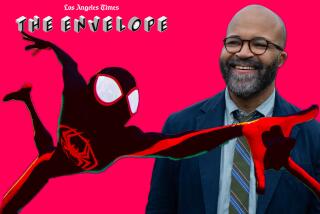‘Simon Magus’: Darkness in a Dreamlike Light
- Share via
“Simon Magus” is a dark and dreamlike fable, “a tale” as its subtitle puts it, “from a vanished world.” Poetic and ambiguous, it manages to be magical in both the beautiful and terrifying senses of the word.
That vanished world, the everyday life of a small Polish Jewish village in the late 19th century, is not a stranger to film, but young British director Ben Hopkins, whose feature debut this is, has handled it with a style and attitude quite his own.
For one thing, Hopkins has taken pains to create a dreamlike atmosphere that manages to be both realistic and not. Using lush Wales locations (photographed by Nic Knowland) made even moodier by artful deployment of fog, “Simon Magus” also benefits from an evocative Deborah Mollison score based, the press material informs, on the fourth movement of Shostakovich’s Piano Quintet in D minor.
Hopkins’ dying town has a grittier, nontraditional feel to it, including as it does a rabbi who has no compunctions about mandating corporal punishment for misbehavior and a protagonist whose work includes emptying everyone’s latrine. Like that title character, the place seems to exist in a kind of twilight zone where the fantastical and the supernatural can be everyday occurrences.
Though he wears a variant of a magician’s pointed hat, Simon is just Simon the village idiot to his neighbors, a mentally damaged individual who lives in a ruined hovel. Children throw stones at him, adults try to avoid what they consider his evil eye, and his fellow Jews refuse to let him pray with them because of his tendency to launch into torrents of gibberish.
Noah Taylor, who played the teenage David Helfgott in “Shine” and the rock band Stillwater’s manager in “Almost Famous,” has said that he felt exceptionally close to this role, and it shows. He exactly captures Simon’s uneasy combination of canniness and dementia, how he manages to be simultaneously conniving, pitiable and subject to truly terrifying visions.
The scariest of those include, as the villagers fear, chats with the devil himself. Impeccably played by a riveting Ian Holm, the Prince of Darkness is forever giving Simon marching orders the man is understandably too frightened to question.
Dovid (Stuart Townsend), one of Simon’s neighbors, has more mundane concerns. He is in love with an older woman, the widow Leah (Embeth Davidtz), who doubts his passion. And, rather than watch the town wither away because it has no train station, he’d like to open one himself, if he can procure the land. That brings him to the all-powerful local nobleman, called the squire and played, in an unexpectedly playful characterization, by Rutger Hauer.
The squire may in effect own the town, but he is bored by business. He’s a lonely man who’s in love with poetry, even having written a volume himself, and exasperated at the lack of culture around him, he toys with ways of bringing poetry into his possible deal with Dovid. Which brings that young man to Sarah (Amanda Ryan), a young woman just back from getting a city education and the only person around whose passion for literature matches the squire’s.
Aside from the devil, the other darkness in “Simon Magus” comes from human anti-Semitism. It’s in part epitomized by Maximilian Hase (Sean McGinley), a business rival of Dovid’s, but there are other manifestations. In the film’s starkest scene, Simon wanders out to the railroad tracks and has a horrifying vision of a train carrying dead Jews to hell. It’s an adroit and surprisingly restrained prefiguration of what the rest of the 20th century was to bring.
* Unrated. Times guidelines: adult subject matter, disturbing images.
‘Simon Magus’
Noah Taylor: Simon
Stuart Townsend: Dovid
Sean McGinley: Hase
Embeth Davidtz: Leah
Amanda Ryan: Sarah
Rutger Hauer: Squire
A Fireworks Pictures release, a Jones Company production in association with Film Four, Lucky Red, ARP and Hollywood Partners and the Arts Council of England, released by IDP Distribution. Director Ben Hopkins. Producer Robert Jones. Screenplay Ben Hopkins. Cinematographer Nic Knowland. Editor Alan Levy. Costumes Michelle Clapton. Production design Angela Davies. Art director Martyn John. Running time: 1 hour, 46 minutes.
In limited release.
More to Read
Only good movies
Get the Indie Focus newsletter, Mark Olsen's weekly guide to the world of cinema.
You may occasionally receive promotional content from the Los Angeles Times.











